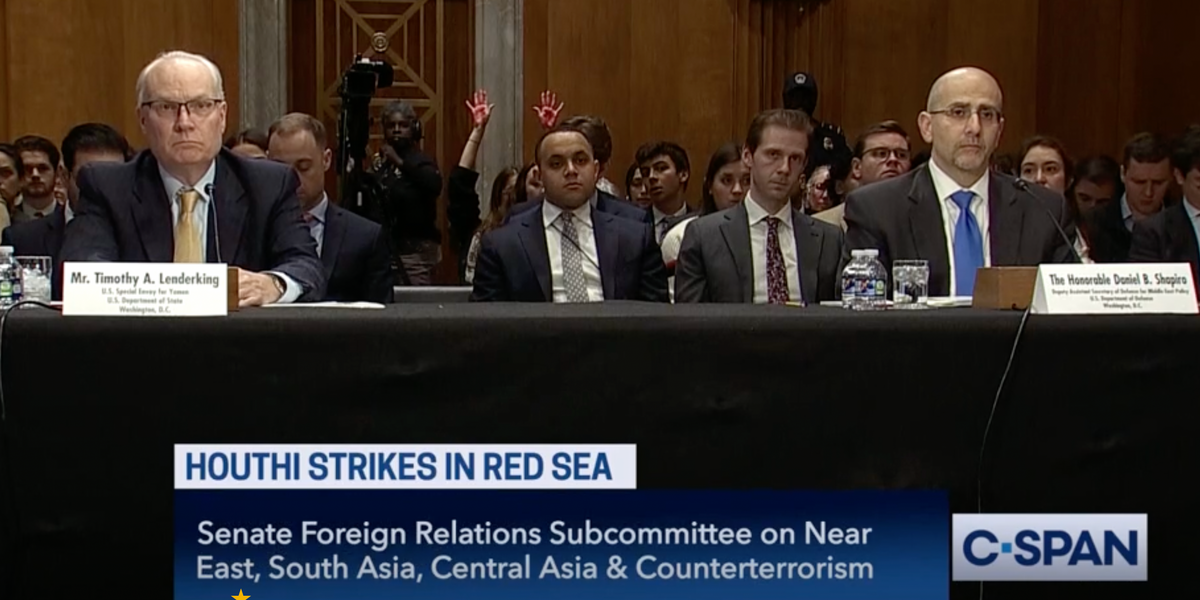A bipartisan group of senators expressed, in the words of Sen. Tim Kaine (D-Va.), “grave skepticism” over President Joe Biden’s approach to trying to de-escalate tensions with the Houthis in the Red Sea, grilling administration officials about the legal authority and strategic effectiveness of their policy during a hearing on Tuesday.
Sens. Kaine, Chris Murphy (D-Conn.), and Todd Young (R-Ind.) led the way in questioning witnesses Timothy Lenderking, the State Department’s special envoy for Yemen, and Daniel Shapiro, the Deputy Assistant Secretary of Defense for the Middle East, during testimony in front of the subcommittee on the Near East, South Asia, Central Asia, and Counterrorism.
The witnesses spoke out against ongoing Houthi attacks saying that it was causing major disruptions to the global economy, jeopardizing diplomacy between Saudi Arabia and Yemen, and risking further regional escalation in the Middle East.
“These attacks which affect the entire region cannot go unchallenged,” said Shapiro.
That response, according to Shapiro, has included striking over 230 Houthi targets, which, he claimed “likely destroyed hundreds of Houthi weapons.”
Kaine, Murphy, and Young, who, along with Sen. Mike Lee (R-Utah) sent a letter to the White House in late January pressing the administration on its strategy, took the opportunity to ask its representatives the questions directly.
All three Senators pushed the witnesses on the legal authority and historical precedent the administration was operating under as it carries out a series of airstrikes. The administration officials maintained that the President’s article II authorities served as justification.
“Article II self-defense means you can defend U.S. personnel, you can defend U.S. military assets, you probably can defend U.S. commercial ships. But the defense of other nations' commercial ships? In no way and it's not even close,” said Kaine. “It is, in my view, laughable to call that self-defense.”
Young also focused his line of questioning on the administration’s theory of deterrence. As Biden himself has admitted, strikes against Houthi targets have not stopped the group’s actions in the Red Sea. When pushed by Young, Shapiro said “until they stop, we are not done” with airstrikes. Shapiro effectively declined to answer Young’s follow-up question over what level of military activity the administration thought necessary to deter the Houthis, and what level of military activity they would be willing to pursue to reach that endpoint. As Murphy later noted, 23,000 Saudi airstrikes in Yemen between 2015 and 2022 — some of which had hit the same places that U.S. strikes were now targeting — failed to alter the Houthis' calculus, and there was little evidence that more limited airstrikes from Washington today would have a different result.
One point of animated discussion and disagreement during the hearing was on one path that some senators thought could push the Houthis to stop their aggression: pushing for a truce in Gaza.
There was quite a bit of skepticism over the Houthi claim that its aggression was a result of Israel’s brutal war on Gaza and Washington’s continued support for it. Murphy called this claim “ridiculous on its face,” Young said it was “parroted rhetoric,” Lenderking argued that tying the two issues together was “entirely an illegitimate linkage,” and Shapiro stated that the situation was “entirely unrelated to Israel.” All pointed to the fact that Houthi attacks were “indiscriminate,” as Shapiro put it, and had targeted a number of non-Israeli ships.
Yet, as Kaine and Sen. Chris van Hollen (D-Md.) noted, Houthi attacks notably decreased during a short-term truce in Gaza in late November and early December 2023. “I am a little disappointed that you so quickly try to pull cold water on the idea that this is connected to the war in Gaza. These attacks started, Secretary Shapiro, as you said on November 19,” said Kaine. “I think the most natural interpretation of this is the Houthis, seeing some suffer in the region, are saying others are going to suffer in the region until we've figured out a response.” He added that the U.S., in his opinion, will not be able to re-establish deterrence until they get a hostage deal that leads to a longer truce in Gaza.
When challenged by Van Hollen, Shapiro did acknowledge that attacks declined during the first truce, but argued that the trend could have been coincidental, and that other periods of calm in the Red Sea had come after rounds of airstrikes.
Right after calling the linking of the two issues “entirely illegitimate,” Lenderking seemed to admit a ceasefire could ease tensions, while also suggesting that the Biden administration was not prepared to push for that outcome. “The fact that they continue this and have said publicly that they will not stop until there's a ceasefire in Gaza is an indication that we're not yet at the point, unfortunately, where they do intend to dial back,” he said.
The hearing also featured more partisan attacks on the administration’s Middle East policy and no senators expressing outright support for its strategy, demonstrating a level of frustration among some of the Senators most involved in regional affairs over Biden and his team’s approach.
That anger also extended to protesters who interrupted proceedings on two occasions. “You all know exactly how to stop the blockade in the Red Sea,” one of them said. “And that’s to stop support for the genocide in Gaza.”
- Are Houthi attacks doing that much damage to the world economy? ›
- Attacks on Red Sea shipping pay dividends for Yemen’s Houthis ›














